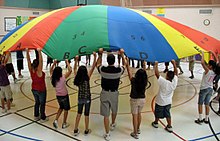
Back Liggaamlike Opvoeding Afrikaans تعليم جسدي Arabic शारीरिक शिक्षा AWA Bədən tərbiyəsi Azerbaijani Educació física Catalan Tā̤-ṳ̆k CDO Tělesná výchova Czech Sportunterricht German Φυσική αγωγή στην Ελλάδα Greek Educación física Spanish


Physical education, often abbreviated to Phys. Ed. or PE, and sometimes informally referred to as gym class or simply just gym, is a subject taught in schools around the world. PE is taught during primary and secondary education and encourages psychomotor, cognitive, and effective learning through physical activity and movement exploration to promote health and physical fitness.[1] When taught correctly and in a positive manner, children and teens can receive a storm of health benefits. These include reduced metabolic disease risk, improved cardiorespiratory fitness, and better mental health.[2] In addition, PE classes can produce positive effects on students' behavior and academic performance.[3] Research has shown that there is a positive correlation between brain development and exercising.[4] Researchers in 2007 found a profound gain in English Arts standardized test scores among students who had 56 hours of physical education in a year, compared to those who had 28 hours of physical education a year.[5]
Many physical education programs also include health education as part of the curriculum. Health education is the teaching of information on the prevention, control, and treatment of diseases.[6]
- ^ Sun, Haichun; Li, Weidong; Shen, Bo (July 2017). "Learning in Physical Education: A Self-Determination Theory Perspective". Journal of Teaching in Physical Education. 36 (3): 277–291. doi:10.1123/jtpe.2017-0067. ISSN 0273-5024.
- ^ Hollis, J.L.; Sutherland, R.; Williams, A.J.; et al. (April 24, 2017). "A systematic review and meta-analysis of moderate-to-vigorous physical activity levels in secondary school physical education lessons". International Journal of Behavioral Nutrition and Physical Activity. 14 (1). BMC: 52. doi:10.1186/s12966-017-0504-0. PMC 5402678. PMID 28438171.
- ^ Wong, Alia (2019-01-29). "Gym Class Is So Bad Kids Are Skipping School to Avoid It". The Atlantic. Retrieved 2019-01-30.
- ^ Reynolds, Gretchen (15 September 2010). "Phys Ed: Can Exercise Make Kids Smarter?". The New York Times. Retrieved 18 April 2013.
- ^ Tremarche, Pamela V.; Robinson, Ellyn M.; Graham, Louise B. (2007). "Physical Education and Its Effect on Elementary Testing Results". Physical Educator. 64 (2): 58–64.
- ^ Ruiz-Ramírez, Jessica Alejandra; Olarte-Arias, Yury Arenis; Glasserman-Morales, Leonardo David (2021-06-15). "Educational Processes for Health and Disease Self-Management in Public Health: A Systematic Review". International Journal of Environmental Research and Public Health. 18 (12): 6448. doi:10.3390/ijerph18126448. ISSN 1660-4601. PMC 8296271. PMID 34203594.
© MMXXIII Rich X Search. We shall prevail. All rights reserved. Rich X Search